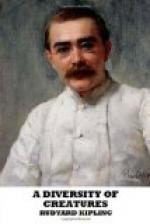‘I give this person in charge for assault.’
‘But, good Lord!’ said the sergeant, whiter than Woodhouse. ’It’s Sir Thomas.’
‘Whoever it is, it isn’t fit to be at large,’ said Woodhouse. The crowd suspecting something wrong began to reassemble, and all the English horror of a row in public moved us, headed by the sergeant, inside the lodge. We shut both park-gates and lodge-door.
‘You saw the assault, sergeant,’ Woodhouse went on. ’You can testify I used no more force than was necessary to protect myself. You can testify that I have not even damaged this person’s property. (Here! take your stick, you!) You heard the filthy language he used.’
‘I—I can’t say I did,’ the sergeant stammered.
‘Oh, but we did!’ said Ollyett, and repeated it, to the apron-veiled horror of the lodge-keeper’s wife.
Sir Thomas on a hard kitchen chair began to talk. He said he had ’stood enough of being photographed like a wild beast,’ and expressed loud regret that he had not killed ‘that man,’ who was ’conspiring with the sergeant to laugh at him.’
’’Ad you ever seen ‘im before, Sir Thomas?’ the sergeant asked.
’No! But it’s time an example was made here. I’ve never seen the sweep in my life.’
I think it was Bat Masquerier’s magnetic eye that recalled the past to him, for his face changed and his jaw dropped. ‘But I have!’ he groaned. ‘I remember now.’
Here a writhing man entered by the back door. He was, he said, the village solicitor. I do not assert that he licked Woodhouse’s boots, but we should have respected him more if he had and been done with it. His notion was that the matter could be accommodated, arranged and compromised for gold, and yet more gold. The sergeant thought so too. Woodhouse undeceived them both. To the sergeant he said, ’Will you or will you not enter the charge?’ To the village solicitor he gave the name of his lawyers, at which the man wrung his hands and cried, ’Oh, Sir T., Sir T.!’ in a miserable falsetto, for it was a Bat Masquerier of a firm. They conferred together in tragic whispers.
‘I don’t dive after Dickens,’ said Ollyett to Bat and me by the window, ’but every time I get into a row I notice the police-court always fills up with his characters.’
‘I’ve noticed that too,’ said Bat. ’But the odd thing is you mustn’t give the public straight Dickens—not in My business. I wonder why that is.’
Then Sir Thomas got his second wind and cursed the day that he, or it may have been we, were born. I feared that though he was a Radical he might apologise and, since he was an M.P., might lie his way out of the difficulty. But he was utterly and truthfully beside himself. He asked foolish questions—such as what we were doing in the village at all, and how much blackmail Woodhouse expected to make out of him. But neither Woodhouse nor the sergeant nor the writhing solicitor listened. The upshot of their talk, in the chimney-corner, was that Sir Thomas stood engaged to appear next Monday before his brother magistrates on charges of assault, disorderly conduct, and language calculated, etc. Ollyett was specially careful about the language.




